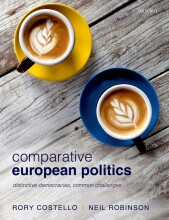Summary: Theories Of Comparative Politics
- This + 400k other summaries
- A unique study and practice tool
- Never study anything twice again
- Get the grades you hope for
- 100% sure, 100% understanding
Read the summary and the most important questions on Theories of comparative politics
-
1 Week 1
-
1.1 Theory and comparative Politics (Lichbach text)
-
What can be said about the discussion about whether or not comparative politics is theoretical?
It is often said by IR-scholars that CP is not theoretical. But it is theoretical in a different way. It is more a mid-range theory; it is about the things behind your approach to a subject. -
What are the three main perspectives in CP that Lichbach talks about?
- rational choice perspective
- cultural perspective
- structural perspective -
What is the rational choice perspective in CP about, according to Lichbach's text?
It is about the preference of maximization. Individuals are rational, which means that they are able to order their preferences. These individuals have to deal with institutional constraints when they are trying to maximize their preferences. The ultimate goal is to reach an equilibrium (all sides are satisfied given the circumstances that they maximize their preferences in. -
What is the cultural perspective in CP about, according to Lichbach's text?
It is about the shared meanings between the individuals. It is more broad than rational choice. It can refer to symbols, language and traditions. These objects obtain their meaning through collective interpretation. -
What is the difference between inter-subjective and subjective research in the cultural perspective in CP?
- intersubjective -> we need to measure it -> content/discourse analysis
- subjective -> quantitative research -> aggregating individual preferences and argue that their cultural patterns facilitate or not facilitate processes -
What is the structural perspective in CP about, according to Lichbach's text?
Structuralist tend to look for concepts which actors are embedded in. Institutions are entities that exist and they structure and create the rules in which individuals are embedded in and in which they act. -
What is the difference in ontology (the nature of experience) between the three approaches?
1. Rational choice -> methodological individuals -> interested in individual intentions and collective outcomes.
2. Culturalist -> holists -> rules constitute the individual and group identities -> embedded in culture and the linkages and relationships in that culture
3. Structuralists -> relations among actors in an institutional context -> roles and relations are embedded in institutional structure -> they look more broad than the culturalists -
What is the difference in methodology between the three approaches?
1. Rationalists -> comparing events with external shocks using a sort of thought experiment
2. Culturalists -> more interpretation of the meanings, frames and intentions -> to uncover
3. Structuralists -> believe that the world exist out there and that the world needs to be uncovered -
What do the three approaches think about comparison (which is the key in social sciences)?
1. Rational choice -> world is here to observe and we need to produce generalization. Realize that different circumstances lead to different behavior and than want to generalize
2. Culture -> cannot make generalizations. Things are much more specific. It is about interpretations and understanding.
3. Structure -> comparison and generalization is possible. But, generalization among kinds. The scientist has to work to uncover these generalizations -
2 week 2
-
2.1 background of the readings
This is a preview. There are 1 more flashcards available for chapter 2.1
Show more cards here -
Why should we read about democracies as Political scientists in CP?
CP is about political regimes and democracy is central to comparative politics
- Higher grades + faster learning
- Never study anything twice
- 100% sure, 100% understanding
Topics related to Summary: Theories Of Comparative Politics
-
Important from the readings
-
Representation - Theiss-Morse & Hibbing and stealth democracy
-
Representation - Caramani and technocracy
-
Political sociology and social movements - bridging disciplinary by going meta
-
Political sociology and social movements - political sociology: beyond social protests and strikes
-
Totalitarian and authoritarian systems
-
Theories of cleavage and polarization
-
Political parties - Katz&Mair and cartel parties
-
Political parties - Kitschelt and movement parties
































